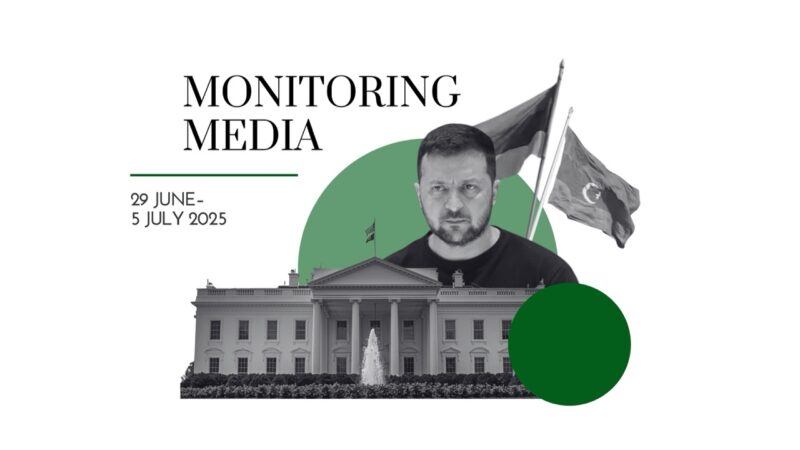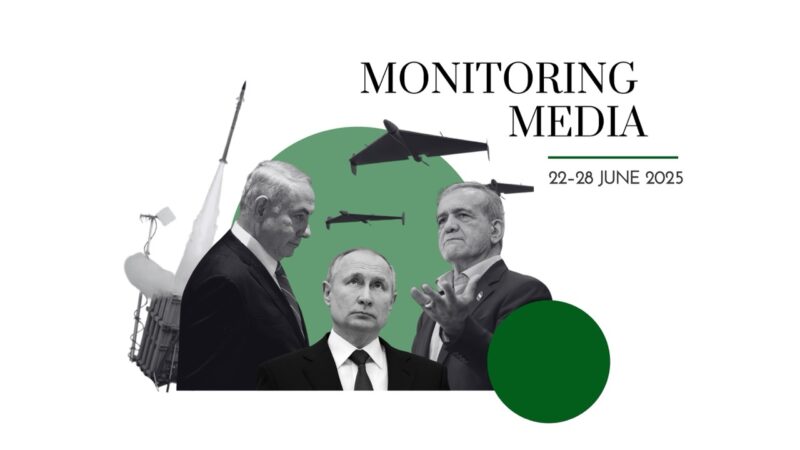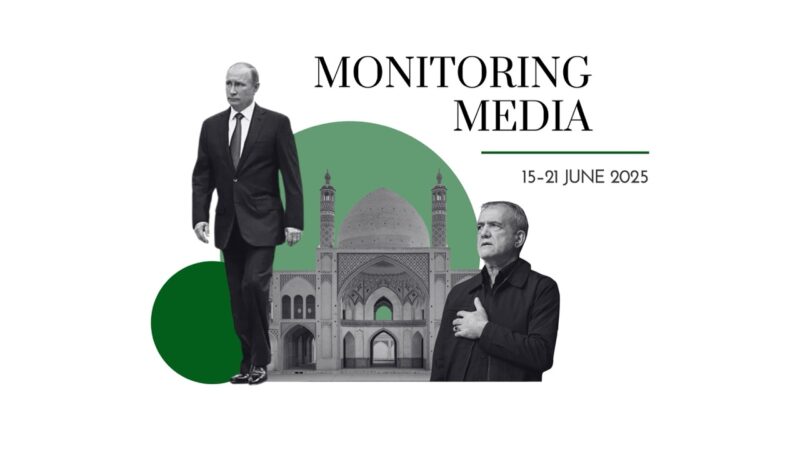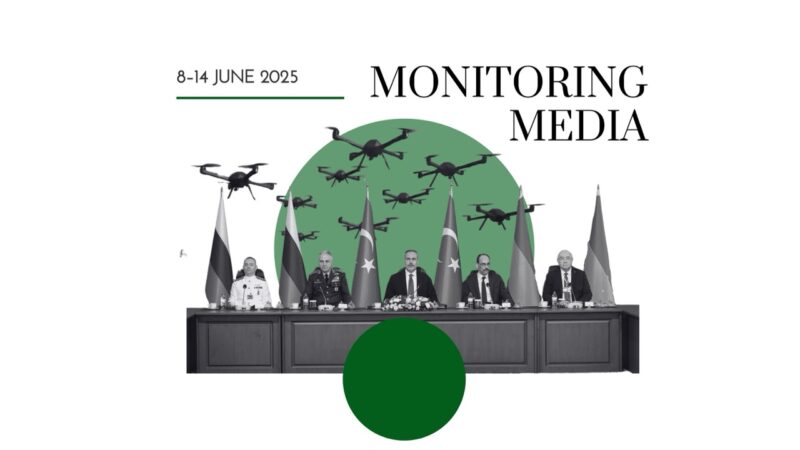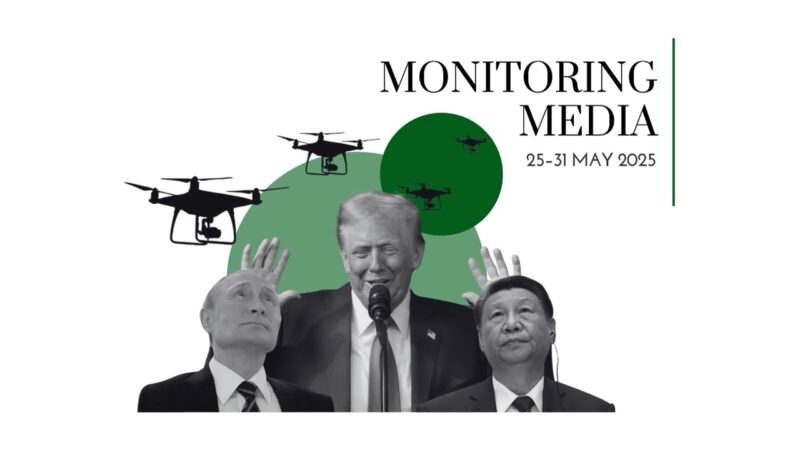“Military Schengen” has arrived

CIUS weekly report on North American media coverage of Ukrainian affairs, 03–09 March 2024
Five publications (Foreign Policy, The National Interest, Wall Street Journal, Foreign Affairs, and Globe and Mail) were selected to prepare this report on how Ukraine has been portrayed in the North American press during the past week. The sample was compiled based on their impact on public opinion as well as on their professional reputation, popularity among the readership, and topical relevance. These publications represent centrist viewpoints on the political spectrum.
This MMS report covers only the most-read and relevant articles about Ukraine, as ranked by the respective North American publications themselves in the past week. Its scope covers promoted articles on home pages and articles from special sections on Ukraine, with the hashtag #Ukraine, from the paper editions of the publications, and about Ukraine from opinion columns and editorials.
Topics featured in the selected articles:
- The world and Ukraine: the era of “military Schengen” has arrived; US containment policy should be revived; Europe will soon be facing a defence dilemma;
- Russia at war: Central Asia is Russia’s back door for battlefield goods; Russia and China may create an aircraft carrier alliance.
MMS summaries
Central Asia is Russia’s back door for battlefield goods. Clarence Leong and Liza Lin (Wall Street Journal) write that trade routes through Central Asia are a way for Moscow to avoid Western sanctions. Central Asian countries such as Kazakhstan and Kyrgyzstan often serve as a channel for the supply of dual-use goods to Russia. Central Asian states also constitute “a growing pipeline for Russia, made possible by thousands of miles of open borders, opaque trade practices, and opportunistic middlemen.” The US and its allies monitor dual-use goods subject to sanctions—“45 items on the list last year, with another five added in February”—but significant volumes were exported to Russia regardless. Drones, which are a key tool in Russia’s war against Ukraine, are also transported through these countries: “In 2023, Kazakhstan bought $5.9 million worth of unmanned aircraft from China and exported $2.7 million worth of such products to Russia, according to Kazakhstan and Chinese trade data. Kazakhstan isn’t a major producer of drones.” These two Central Asian countries are not the only source of dual-use goods for Russia: “Goods are also flowing through countries such as the United Arab Emirates and Turkey.” As the authors note, many goods supplied from China are produced by American companies: “For example, seven shipments of ‘computing machine devices’ that are considered dual-use goods were made in June 2023 from a Chinese subsidiary of International Business Machines to a trader in the Kyrgyz capital of Bishkek. Those shipments, worth $3,700, ended up at OOO BSO, a Russian business on a Treasury Department blacklist.”
The “military Schengen” era has arrived. Anchal Vohra (Foreign Policy) emphasizes that the first step for Europe’s common military ambitions is figuring out free movement. This will improve military mobility and thus strengthen Europe’s collective security. The idea of creating a “military Schengen” was first voiced ten years ago, but it became supremely relevant in 2022: “The idea of a military Schengen first came up after Crimea’s annexation by Russia. Ten years after Russia’s annexation of Crimea and two years after its ongoing full-scale invasion of Ukraine, Europe is realizing that it better need to prepare for the possibility that Russian President Vladimir Putin will decide to use his military even further westward.” However, according to the author, this initiative faces significant challenges, including “bureaucratic hurdles and gaping infrastructural gaps that can cause decisive delays.” Coordination of military matters is a difficult task even for two countries, let alone all EU member states: “In late January Germany, the Netherlands, and Poland signed an agreement to create a military transport corridor between them, giving a much needed boost to the long discussed but rarely pursued goal of improving military mobility across Europe.” According to Vohra, “The EU has acknowledged the need for funding dual-use—civilian and military—infrastructure and already approved funding for 95 such projects, although many more bid for the funds.”
US containment policy should be revived. Max Bergmann, Michael Kimmage, Jeffrey Mankoff and Maria Snegovaya (Foreign Affairs) emphasize that Russia’s war against Ukraine has forced Washington to reconsider its fundamental attitude towards Moscow. Confronting Russia requires a long-term strategy that replicates the containment “which guided the United States through the Cold War, or what President John F. Kennedy called a ‘long, twilight struggle’ against the Soviet Union.” Current US political policy should be based on an updated version of the containment strategy, taking into account the following two points: (1) rely more on its allies; and (2) take into account the changing geography of deterrence. Washington must be prepared to help substantially in the containment of Russia’s ambitions in Europe: “This strategy would signal to NATO allies and to Ukraine that the United States remains steadfastly committed to European security, while reassuring U.S. officials and American citizens worried about escalation.” Continued support of Kyiv is crucial to deterring Moscow. Ultimately, Ukraine’s victory and its integration into the West is a guarantee of Europe’s security. Washington should also contain Russia in other parts of the world but with other tools, “such as support for governance reform and trade”; the US should be careful to not alienate countries that would otherwise take a neutral position; after all, the confrontation with Russia is only one of the axes of a global confrontation. According to the authors, “In the twenty-first century, the United States will not be able to orient its foreign and security policy solely around the struggle with Moscow. Any strategy for containing Russia must account for resource commitments to the Indo-Pacific and for the impact of U.S. policy on the Chinese-Russian relationship. That complicated reality requires U.S. allies, especially in Europe, to take on a larger share of directing the containment of Russia.”
Will Russia and China create an aircraft carrier alliance? Brandon J. Weichert (National Interest) is convinced that the expansion of China’s aircraft carrier fleet and its strategic partnership with Russia could change the global naval dynamic. Despite the fact that Beijing “continues to grow its fleet of aircraft carriers,” China’s maritime strategy “focuses less on the offensive capabilities of its aircraft carrier fleet, and more on Beijing’s vast arsenal of long- and medium-range missiles.” This is what poses a serious threat to US forces in the Indo-Pacific region. On the other hand, Russia “has yearned to become a dominant naval power since the time of Peter the Great.” And because of this, Moscow’s spending of huge resources on “maintaining its lone, broken-down aircraft carrier has long been a matter of international wonder.” According to the author, the reason for this is Moscow’s fear of losing its “key capability—aircraft carrier operations.” Russia wants an aircraft carrier fleet, and “China is proving it can mass-produce them.” This symbiosis could be extremely dangerous for the United States and its allies. According to the author, “China and Russia are already in deep cooperation, and it is still growing. It’s only a matter of time before the dragon teaches the bear how to swim.”
Macron’s Ukraine messaging urges NATO to confront the inevitable. Konrad Yakabuski (Globe and Mail) argues that French President Emmanuel Macron has garnered attention and stirred controversy with his outspoken remarks on geopolitical matters, often leaving Western allies uneasy. From questioning NATO’s strength to attempting to negotiate with Russian leader Vladimir Putin, Macron’s actions have generated mixed reactions. Macron’s recent call for Western countries to consider sending troops to Ukraine has sparked strong rebuttals from some NATO allies. His assertion advocating for “strategic ambiguity” regarding potential troop deployment was swiftly condemned by US President Joe Biden and German Chancellor Olaf Scholz. The author highlights the fact that Macron’s statements risk exacerbating tensions within NATO and playing into Putin’s hands. While his bold stance may unsettle some, Macron’s insistence on accepting the reality of the situation is forcing NATO allies to confront difficult decisions. As Macron emphasized in a recent speech in Prague, “If every day we explain our limits to someone who has none…the spirit of defeat is lurking.”
Western leaders beginning to reevaluate their response to Russia’s war in Ukraine. Gary Mason (Globe and Mail) highlights how the late Senator John McCain’s prescient understanding of Russian President Putin’s ambitions, particularly in Ukraine, continues to resonate amidst the ongoing war. McCain’s warning in 2014 regarding Putin’s aggression and the West’s tepid response remains strikingly relevant today as Russian troops inch further into Ukrainian territory. French President Emmanuel Macron’s recent call for a more robust and urgent response to support Ukraine, including the potential deployment of European troops, underscores a shifting dynamic among Western leaders, Mason argues. While uncertainties loom over Putin’s willingness to risk global conflict, the alternative of allowing him to continue unchecked poses dire consequences for Ukraine and threatens broader international security. “Is Mr. Putin insane enough to blow up the world if the West does insert itself more fully into the war? If it puts boots on the ground? Possibly. No one knows for sure,” Mason writes. “But the alternative is to stand by and watch Mr. Putin abscond with an entire country, one that was just beginning to enjoy the fruits of its hard-fought-for freedoms.” Only through thwarting Putin’s expansionist ambitions can the world regain a semblance of security and stability.
Ukraine’s progress in Crimea threatened by ammunition shortages, delayed Western support. Jillian Kay Melchior (Wall Street Journal) reports that targeted strikes on Russian assets and naval bases have significantly disrupted Russian operations. In defending against a formidable adversary, Ukraine has demonstrated its ability to effectively utilize unconventional tactics and precision strikes in order to hinder Russian naval activities and weaken logistical infrastructure. However, Ukraine’s progress is hampered by a critical shortage of ammunition and long-range precision weapons. Delays in providing Ukraine with vital military resources undermine its ability to capitalize on strategic opportunities and maintain pressure on Russian forces. With Russia adapting and bolstering its defenses in Crimea, the urgency for Western assistance, particularly in supplying high-precision weapons, is crucial. “In Crimea and elsewhere, Ukraine has proved it can make progress against Russia when it has the necessary weapons,” the author concludes. “The U.S. risks squandering that potential with politically driven delays.”
Europe will soon face a defence dilemma. Eric Reguli (Globe and Mail) writes that the urgency for Ukraine to acquire weapons is paralleled by Europe’s need to bolster its own military capabilities. As Russia’s aggression looms over the continent, the European Union is grappling with how to fortify its defence industry. Proposals from the European Commission, such as common funding through defence bonds, aim to centralize control over the weapons market. However, according to the author there is concern regarding the potential for mission creep and concentration of power in supranational entities. An alternative approach suggests increasing national military spending to the long-established NATO minimum of two percent of GDP, which would allow market forces to drive production and innovation in the defence sector. In any case, with defence spending already increasing in response to Russia’s full-scale invasion of Ukraine, the EU could further enhance efficiencies by encouraging company mergers and promoting joint research and development. EC President Ursula von der Leyen recently announced that the EU’s combined military budgets shallould increase to €350 billion this year, nearly doubling 2021 levels. Moreover, NATO predicts that 18 member states will reach 2% this year, a significant rise from just three countries in 2014. But Canada’s military expenditure remains below the threshold, standing at less than 1.4% in 2023. Reguli concludes that the EU’s path forward should involve striking a balance between centralized planning and market-driven dynamics to ensure a robust military industry that is capable of meeting the threats posed by the Kremlin.
Legacy of Brian Mulroney, a lifelong friend of Ukraine. Bob Onyschuk (Globe and Mail) describes Brian Mulroney’s legacy, whose significant contributions to Canadian history extend beyond domestic affairs, leaving an indelible mark on the geopolitical landscape. Onyschuk underscores the former prime minister’s pivotal role in the collapse of the Soviet Union and the subsequent independence of Eastern European nations, including Ukraine. In the late 1980s and early 1990s, Mulroney’s proactive engagement with Ukraine played a crucial part in bolstering its sovereignty, symbolized by the decision to open a Canadian embassy in Kyiv in May 1992. As the author notes, Mulroney’s swift action demonstrated Canada’s unwavering support for Ukraine during its early independence struggles. His instrumental role in advocating for Ukraine, including welcoming Ukrainian leaders to Ottawa and facilitating Canada’s recognition of Ukraine as a sovereign nation, solidified Canada’s role as a supportive ally in Ukraine’s journey toward democracy.
